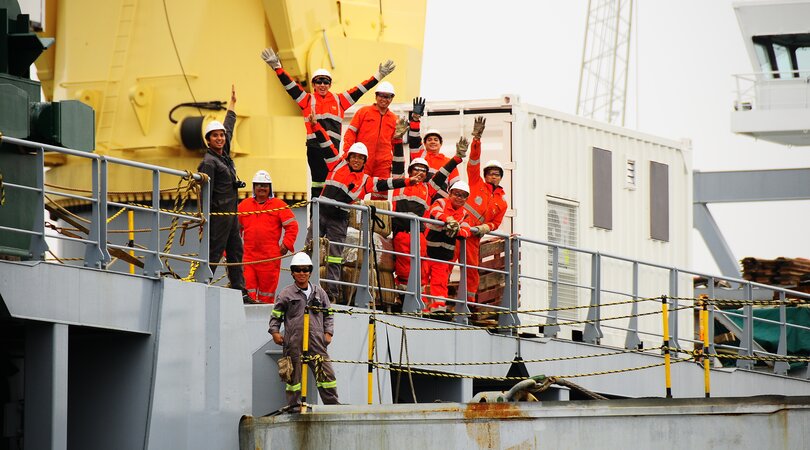Our new NorthStandard site is now live. There will be no new content or updates added to this site. For the latest information, please visit our new site north-standard.com.
記事:乗組員管理-将来的な形態
スタンダードクラブの上級検査員であるSudhir Malhotraが、「Maritime Risk International」で発行された記事で、配送業界がどのように変化しつつあるか、またそれに伴う乗組員関連事項について考察しています。

配送業界は、間違いなく一人の人間が行うことができる最も人生を変えるキャリアの選択の1つです。通常、人は若く感受性の強い時、主に10代に進路選択を行います。多くの場合、人は世の中を見て堅実なキャリアを築き、そして自分の努力に対するある程度の報いを得るというビジョンを持って船乗りになります。 上記にかかわらず、一人の人間が商業の世界に参加する時、世界のサプライチェーンの歯車の一部となり、世界中に商品、エネルギー、原材料を商業的に配送するシステムの不可欠な存在となるのです。経済的で効率的な長距離輸送を提供する船舶輸送の能力は、世界経済の中心的存在です。 国際海運会議所(ICS)が指摘しているように、船舶輸送と世界貿易の影響とそれが生み出す繁栄を過小評価することはできません。毎年約110億トンの商品が船舶で輸送されています。2019年の時点で、世界海運業の年間総額は14兆米ドルを超えています。毎年、海運業は20億トン近くの原油、10億トンの鉄鉱石(鉄鋼を作るために必要な原料)、および3億5000万トンの穀物を輸送しています。 それで、この大きなキャリアの選択をした船員の話に戻りますが、彼らはどこに身を置くことになるのでしょうか?現在、彼らは世界のサプライチェーンに不可欠とはいえ、彼らの経験は期待していたものとは言い難いかもしれません。 商業輸送の現実世界では、巨大な商業的圧力があります。結局、すべての船舶は商業目的の設備として走らされ、運用を可能な限り合理化して費用効果の高いものにすることを望む巨大企業によって想定されました。彼らはすべての「脂肪」を取り除きたいと考えています。遅延は許容されません。港湾で過ごす時間は、船舶が商業上の契約を履行し、次の積荷と航海の準備ができていることを確認するためだけ(ただそれだけのため)です。間違いを起こす余地はほとんどなく、間違いを犯した結果は船員にとって非常に厳しい状況になる可能性があります。何かを見落としたことが原因で船舶が遅れた場合は船員は職を失う可能性があります。 船内にはほんの一握りの乗組員だけで、せいぜい20人程度です。乗組員は様々な年齢層、国籍、また異なる職種や階級の出身です。実際にお互いに交流できる時間を持てる人はいるでしょうか? さらに、船舶での作業に伴う階層と規律があります。伝統的な独自の船員制度、そしてしばしば暗黙の個人非難文化により、船員は寡黙になり、ただ流れに沿って進み、自分の殻の中に閉じこもり、自分たちが愚かで専門家らしくないと見られる可能性があるため、あまり多くの質問をしないほうがよいと感じることがあります。 私はこうして批評をしますが、船乗りは決して間違ったキャリアの選択ではありません。そのキャリアは、若い一人の人間に責任を背負う方法を教え、他の専門的職業ではできないような、世界を経験し、異なる文化で働き、共通の目標に向かって比較的見知らぬ人との絆を形成する機会を彼らに与えます。船舶の円滑な運航を実現し、それに伴いながら世界経済とサプライチェーンの原動力となっているのです。船乗りになって数か月以内に、同じ人物は、「やればできる」という態度や、仕事を成し遂げながら挑戦的要素を持ちつつも魅力的で冒険的な新しい環境に適応するという、求められるスキルセットを身につけることができるのです。船は決して止まることはなく、船員は目に見えない触媒であり、それなしでは世界貿易は機能しなくなるでしょう。 残念ながら、新型コロナウイルスの危機は、船員の士気を喪失させました。船員が乗船/下船できないことの不確実性、不安定な新型コロナウイルス状況、ワクチン接種を受けているにもかかわらず変化する検疫要件、および多くの港湾当局および勝手を知った場所での乗組員交代の受け入れを拒否した国による船員に対する不適切な扱いなど、これら全てが不可欠な「キーワーカー」の悩みの種を膨らませました。 将来的な形態 これまで船員が最近直面している多くの問題に触れてきました。 60年代と70年代では、船乗りの環境は今日とは大きく異なっていました。船はずっと小さく、乗組員も多かったのです。大抵、航海はより長いものであり、時間があるので仲間意識が構築され、乗組員が互いに交流し絆を深め、空いた時間に交わりを持つことができました。 最近では、ますます孤立し互いに殻に閉じこもるようになっている乗組員同士が交流する時間はほとんどありません。 新型コロナウイルス前の2019年、 イェール大学 による船員1,572人対象の調査では、世界の船員の間で潜在的に危険なレベルのうつ病、不安、自殺リスクが特定されました。調査完了から2週間以内に、回答者の25%がうつ病に苦しみ、17%が不安を経験し、20%が自殺または自傷行為を考えていたことが予備調査結果で示されました。 スタンダードクラブが後援する 船員幸福度指数(SHI) 報告書では、幸福度が第1四半期の10点満点中6.46点から10点満点中5.99点まで急降下した2021年第2四半期の報告結果において、驚くほど類似した結果を示しています。 これらは確実に憂慮すべき統計であり、イェール大学の研究がパンデミック前の2019年に委託されたことを考えると、新型コロナウイルスのパンデミックが間違いなく問題を深刻化させているため、状況が今日はるかに悪化していることを示唆することになるでしょう。 従って、この高まるリスクを認識し、船員の幸福に適切に重点を置くことは、乗組員管理者の責任であります。新型コロナウイルスのパンデミックにより引き起こされた未曽有の乗組員交代の危機的状況に対応して、 乗組員の健康と乗組員交代に関するネプチューン宣言 は、2020年12月に海運協同団体とともにスタンダードクラブにより署名されました。船員の幸福と乗組員交代環境を具体的に改善するために、ネプチューン宣言は次の行動を提案しています。
ウェットバルク輸送セクターとドライバルク輸送セクターの両方の 用船者 グループが、ネプチューン宣言の推奨事項を実行に移すために使用した一連のベストプラクティスの概要を説明しました。 2020年、国際海事機関(IMO)は渡航禁止令を交渉し、ワクチンの優先接種を受けれるように、船員を キーワーカーとして指定よう政府に要請する必要がありました。 新型コロナウイルスにも関わらず、安価に家電製品が手に入るこの時代、乗組員は乗船する際に自分の個人用電子機器(タブレット、ノート型パソコン、スマートフォン、ゲーム機器など)を船内に持ち込む傾向があります。娯楽や船員とその家族をつなぐために使用されるこれらのガジェットは、期せずして船員が他の乗組員から離れて自分の部屋の中でより多くの時間を費やすことにつながります。そのような行動は私たちの時代を反映していますが、船員は自分自身をさらに孤立させたいという誘惑を抑え、可能な限り仲間とつながることを目指すべきです。人間は社会的な動物であり、孤島ではありません。お互いにつながることは、不安、憂鬱、悲観的な傾向の一部を和らげるのに確かに役立ち、船員が今日喉から手が出るほど必要としている信頼、絆そして友情を築くのに役立ちます。 乗組員の管理者は、乗組員の孤立に関する問題にどのように取り組むことができるかを検討する必要があります。恐らく、インターネットアクセス、そして体を動かすゲームや電子ゲームを備えることで、共有エリアとレクリエーションエリアをより望ましい場所にすることに重点的に取り組むことは、乗組員を親しくさせるのに役立つでしょう。一部の船舶にあるインターネットアクセスは特権のように思われるかもしれませんが、乗組員の孤立に取り組むための解決策として共有エリアでのより良い(さらに制御された)インターネットアクセスを検討することは有用かもしれません。 船内で文化的に包摂的な環境を確保することは、船内の幸福基準を改善するために乗組員の管理者が重点的に取り組むべきもう1つの分野です。文化的に入り混じった乗組員のいる船舶に人員を配置するという現象は海運業界では目新しいものではありませんが、潜在的な誤解やミスコミュニケーション(意思疎通が上手くできていない)問題を招き易い可能性があります。世界海事大学(World Maritime University)の研究によると、海難事故の増加は多言語・多文化の船舶でのさまざまな行動の意図した効果が得られないコミュニケーションや誤った解釈に起因するため、船舶の文化的複雑性に注意が向けられるようになっています。文化的に認識する環境を促進し、グローバルマインドセットを身に付け、言語スキルを向上させ、文化の違いを尊重することは、乗組員に対して文化的多様性と包括性に関する教育に役立つ上で乗務員の管理者が検討できるアイデアの一部です。 さらに、船員は率直に発言するように推奨されるべきであり、上司と一緒にいるときに意見を表明する権限を与えられるべきです。これによりあらゆる海上勤務がより安全になるでしょう。そのような議論はより良いコミュニケーションと乗組員間で共有されるメンタルモデルにつながるからです。 最後に、世界中にいる船員すべてに向けた私からのメッセージは、「あなたは一人ではない」です。気分に関係なく、愚かなことは絶対にしないでください。話し相手が必要である場合は、24時間年中無休の国際ホットラインを運営している多数の サポート組織 を利用できます。あなたがこの記事を読んでいる間も、国際機関と政府はあなたが確実に仕事をして愛する人達のもとに安全に帰還できるよう全力を尽くしています。
|

A 2019, a pre Covid-19, study by Yale University on 1,572 seafarers had identified potentially dangerous levels of depression, anxiety and suicide risk amongst the world’s seafarers. Within two weeks of completing the survey, preliminary results indicated that 25% of respondents had suffered depression, 17% had experienced anxiety, and 20% had contemplated suicide or self-harm.
The Seafarer Happiness Index report, sponsored by Standard Club, reveals startlingly similar results in the Q2 2021 report results which saw happiness levels dip from 6.46 in Q1 to 5.99/10, a steep and concerning drop.
These are worrying statistics indeed and considering the Yale study was commissioned in 2019, pre-pandemic, it would only suggest that the situation is far worse today as the Covid pandemic has certainly exacerbated the issue.
It therefore becomes incumbent on crewing managers to recognise this growing risk and to put the right emphasis on seafarer wellbeing. In response to the unprecedented crew change crisis created by the Covid-19 pandemic, the Neptune Declaration on Seafarer Wellbeing and Crew Change was signed by Standard Club alongside the shipping fraternity in December 2020. To make tangible improvements to seafarer wellbeing and crew change the Neptune Declaration suggests the following actions:
- Recognize seafarers as key workers and give them priority access to Covid-19 vaccines.
- Establish and implement gold standard health protocols based on existing best practice.
- Increase collaboration between ship operators and charterers to facilitate crew changes.
- Ensure air connectivity between key maritime hubs for seafarers.
A group of charterers from both the wet and dry bulk sectors have outlined a set of best practices they have used to turn the Neptune Declaration recommendations into action.
In 2020, the International Maritime Organization had to ask governments to designate seafarers as key workers, to allow them to negotiate travel restrictions and put them in line for priority vaccinations.
Notwithstanding Covid, in this age of cheap consumer electronics, crew tend to bring in their own personal electronic gadgets (such as tablets, laptops, smart phones, and gaming devices) onboard when they join the ship. These gadgets which are used for entertainment and connecting the seafarers with their family members, inadvertently leads to them spending more time within their rooms and away from the rest of the crew. While such behaviour is a reflection of our time, seafarers should resist the temptation to isolate themselves further and should aim to connect with their peers whenever possible. Human beings are social animals and not isolated islands – connecting with one another would surely help ease some of the anxiety, depression, and negativity and would help build the trust, bond, and camaraderie that seafarers desperately need today.
Crewing managers need to consider how the issue of crew isolation can be tackled. Perhaps a focus on making the common and recreation areas a more desirable place, with some internet access, and physical and electronic games, which would help bring the crew together. Whilst internet access on some ships may seem a privilege, it could be useful to consider better (yet controlled) internet access in common areas as a solution to tackle crew isolation.
Ensuring a culturally inclusive environment on board is another area for crewing managers to focus on in order to improve wellbeing standards on board. The phenomenon of manning a ship with a culturally mixed crew is not new in the shipping industry but it can easily lead to potential misunderstandings or miscommunication issues amongst them. According to a study by World Maritime University, cultural complexity on ships has become an issue of attention, since a growing number of maritime accidents are attributed to ineffective communication and misinterpretation of different behaviours on multilingual and multicultural vessels. Boosting a culturally aware environment, developing a global mindset, improving language skills, and promoting an appreciation of cultural differences are some of the ideas that crewing managers could consider in helping educate their crew about cultural diversity and inclusion.
Moreover, seafarers should be encouraged to speak up and should be empowered to express their opinions when they are with their superiors. This would make every marine adventure safer, as such discussion would contribute towards better communication and a shared mental model amongst the crew.
Finally, it is my message to all seafarers out there that you are not alone. Regardless of how you are feeling, never do anything foolish. Should you need anyone to talk to there are numerous support organisations operating 24/7 international hotlines you can reach out to. As you are reading this, international organisations and governments are doing all that they can to ensure you can work and return home safely to your loved ones.
カテゴリー: Loss Prevention

